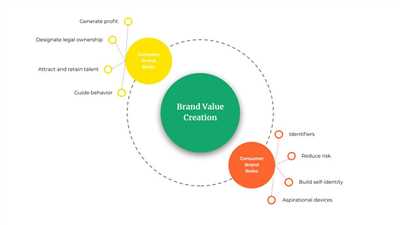
Brands have always played a fundamental role in the business world, but today they’re more powerful than ever. In a market that’s increasingly saturated, companies understand the imperative of having a strong brand to drive sales, engage customers, and create a sense of belonging. But how do brands create value?
First and foremost, brands create value by understanding their customers. By deeply understanding the needs, desires, and values of their target market, brands can build products and experiences that resonate on a deep emotional level. When customers feel a meaningful connection with a brand, they’re more willing to not only buy its products, but also become advocates for the brand.
Secondly, brands create value through effective marketing and branding. A well-executed marketing campaign can open up a whole new market for a company, increasing its customer base and driving sales. By investing in the right talent and resources, companies can build a strong brand that consumers trust and admire.
Furthermore, brands create value by insulating businesses from challenges in the market. When a brand has a strong reputation and loyal customers, it becomes more resilient to changes in the economy or shifts in consumer sentiment. This resilience can be a significant advantage in a competitive market.
Lastly, brands create value by fundamentally changing the way people experience a product or service. When a brand is able to create a unique and engaging experience, it sets itself apart from its competitors and becomes the brand of choice for consumers. This can lead to higher customer loyalty, increased sales, and ultimately, a better bottom line.
The Role of Brands: How Brands Create Value for Consumers and Companies
Brands play a meaningful role in the lives of consumers and companies alike. They open up a world of possibilities, create a sense of belonging, and provide emotional value that goes beyond the core product or service. For consumers, brands offer an experience and a lifestyle that they’re willing to invest in. They find that these brands understand their values and desires, and through engaging marketing practices, create products and services that they want and need.
For companies, brands are a critical driver of sales and growth. Brands create value through customer loyalty, increased sales, and the ability to charge a premium for their products or services. They also serve as insulation against competition, as a strong brand can differentiate a company from its competitors. This is especially important in a mobile and heathy business environment, where companies face constant challenges and need to find ways to stand out.
One of the key ways brands create value is through the emotional connection they build with their customers. Brands that have a strong emotional appeal are able to create advocates, fans who are not only loyal to the brand but also actively promote and recommend it to others. This word-of-mouth marketing is a powerful multiplier, as consumers trust their peers more than traditional advertising.
Another way brands create value is by offering a meaningful experience to their customers. They go beyond just providing a product or service and instead focus on creating an engaging and memorable experience. This can be achieved through innovative design, exceptional customer service, or by aligning the brand with a cause or purpose that resonates with its target audience.
Furthermore, brands create value by building a sense of desirability. They make customers feel like they’re part of something special and exclusive, and this exclusivity drives demand. Companies invest in branding because they understand that a strong brand can command higher prices and attract a larger number of customers.
In today’s competitive marketplace, understanding the role that brands play and how they create value is imperative for companies. Brands are not just a nice-to-have; they’re a must-have. They provide a competitive advantage, drive sales, and attract investors. Having a strong brand is an indicator of a successful and well-managed business.
To sum it up, brands create value for consumers by offering a meaningful experience, building emotional connections, and providing a sense of belonging. For companies, brands drive sales, differentiate them from competitors, and attract investors. Understanding the role of brands and investing in effective branding practices is crucial for both consumers and businesses.
A Question of Value: How do brands create value?

Creating value is a fundamental goal for businesses and brands. In today’s market, where consumers have countless options, it is essential for companies to understand how to build a brand that not only stands out but also drives higher sales.
One of the most successful ways brands create value is by having a meaningful and emotional connection with consumers. This connection goes beyond the product or service itself, it taps into the values and sentiments that consumers hold dear. By aligning with these values, brands can create a sense of belonging and build a loyal customer base.
When consumers feel a sense of belonging, they become advocates for the brand. They’re not just buying a product; they’re buying into a set of values and beliefs. This emotional connection is a powerful multiplier, driving higher sales and creating desirability for the brand.
But how do brands create this emotional connection? It starts with understanding the core values of their target audience. Brands that invest time and effort in understanding what their consumers want are better able to align their practices with consumer sentiment. This can be done through market research, engaging with consumers on social media, or even having open lines of communication with loyal customers.
Furthermore, successful brands work to build trust and resilience. They understand that having a resilient business is crucial in today’s challenging market. This means being adaptable to changing consumer needs and preferences, as well as being able to weather economic downturns. Brands that have the ability to navigate these challenges and still deliver a quality product or service will have a higher perceived value in the eyes of consumers.
Brands also create value through effective branding and marketing strategies. By investing in marketing campaigns that highlight the unique selling points and benefits of their products or services, brands can drive awareness, interest, and ultimately, sales. These campaigns should focus on creating an experience for the consumer, rather than just selling a product.
Another way brands create value is by having a strong sense of purpose. Today’s consumers want to support businesses that have a positive impact on society and the environment. Brands that can demonstrate their commitment to social and environmental causes will often attract a dedicated customer base who are willing to pay a premium for their products or services.
Lastly, creating value also involves having the right talent and heathy business practices. Companies that invest in their employees and create a positive work culture tend to have higher levels of employee satisfaction, which can translate into better customer experiences. Additionally, adopting sustainable and ethical business practices can help attract investors who are looking to support businesses that align with their own values.
In conclusion, brands create value by understanding the values and sentiments of their target audience. By building a meaningful and emotional connection, brands can drive higher sales, create desirability, and build a loyal customer base. This is achieved through effective branding and marketing strategies, aligning with consumer values, building trust and resilience, having a sense of purpose, and adopting heathy business practices. By taking all of these factors into account, brands can create value that goes beyond the product or service they offer and ultimately achieve long-term success.
Multiplier – Investor Sentiment
Investor sentiment plays a critical role in the success of a brand. When investors have a positive perception of a company, they are more willing to invest in it, which can drive up the company’s stock price and increase its market value. This positive sentiment can also attract more investors and create a higher demand for the company’s products or services.
One of the key sources of investor sentiment is the brand’s ability to create value for its customers. Brands that are able to provide meaningful and emotional experiences for their customers are more likely to have advocates who promote the brand to others. This word-of-mouth marketing can result in a higher number of customers and increased sales.
Additionally, brands that have a clear understanding of their core values and demonstrate them through their actions and practices have a higher chance of creating a positive investor sentiment. These brands show that they are not just focused on making money, but also on having a positive impact on the world.
Furthermore, investor sentiment can be influenced by the brand’s ability to navigate challenges and remain resilient in the face of adversity. Brands that are able to adapt to changing market conditions and continue to deliver value to their customers are seen as more reliable and trustworthy by investors.
In the current market, where investors are increasingly looking for companies that align with their own values, branding plays a crucial role. Investors want to support brands that they believe in and that they feel share their values. Brands that can effectively communicate their values and create a sense of belonging for their customers and investors have a higher chance of attracting investment.
Overall, investor sentiment is a powerful multiplier that can significantly impact a brand’s success. Brands that can create a strong emotional connection with their customers, demonstrate their values, and navigate challenges with resilience are more likely to have positive investor sentiment. This, in turn, can drive higher market value and open up opportunities for growth and success in the business.
Sources

In today’s business world, successful brands understand the importance of creating value for their customers. They do this by engaging with consumers on an emotional level and building meaningful connections. To achieve this, they rely on a number of sources and practices that drive brand desirability and loyalty. Here are some key sources that brands use to create value:
| Product | Brands create value by offering products that consumers want and are willing to invest in. They aim to provide powerful solutions that improve the lives and experiences of their customers. |
| Services and Experiences | Brands also create value through the services and experiences they provide. By offering exceptional customer service and unforgettable experiences, they build a sense of belonging and loyalty among their customers. |
| Marketing and Branding | A strong marketing and branding strategy is imperative for businesses to create value. By effectively communicating their brand’s values and meaning, companies can drive sales and build a loyal customer base. |
| Understanding People’s Values | Successful brands invest time and effort into understanding their target audience. By aligning their brand values with the values of their customers, they can create a stronger connection and drive value. |
| Emotional Sentiment | Brands create value by evoking positive emotional sentiment in their customers. This can be achieved through storytelling, creative marketing campaigns, and by showcasing the impact their products or services have on people’s lives. |
| Belonging and Identity | Brands that can create a sense of belonging and help customers express their identity tend to have higher value. When people feel a connection to a brand, they are more likely to advocate for it and become loyal supporters. |
| Resilience and Adaptability | In a fast-paced business environment, brands need to demonstrate resilience and adaptability. By being open to change and constantly evolving, they can stay relevant and continue to create value for their customers. |
| Talent and Engagement | The talent and engagement of a brand’s employees play a crucial role in creating value. Brands that invest in their employees and create a positive work culture are more likely to deliver better products and services to their customers. |
| Mobile and Digital | In today’s digital age, brands need to have a strong presence on mobile and digital platforms. By embracing technology and providing seamless experiences, they can engage with customers on a wider scale and drive value. |
By leveraging these sources, successful brands are able to build a significant multiplier effect, where the value they create for customers extends beyond the products or services themselves. This not only leads to better sales and business performance but also attracts investors and advocates who believe in the brand’s vision and values.










